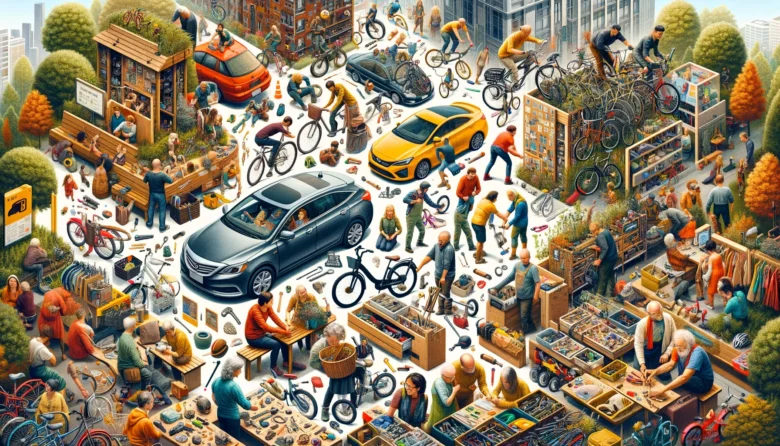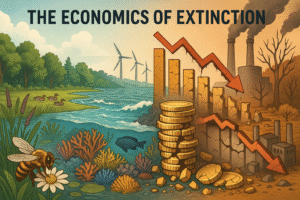In a world rapidly awakening to the limits of our resources, the concept of collaborative consumption offers a refreshing and sustainable alternative. This model, based on sharing, lending, and swapping, is not just about saving money—it’s about building community, conserving resources, and rethinking what we truly need. Let’s explore how collaborative consumption is paving the way toward a more sustainable and connected future.
 Efficient Resource Use
Efficient Resource Use
Efficient resource use is the bedrock upon which collaborative consumption rests. This model challenges the traditional notion of ownership by promoting access over possession. For instance, car-sharing services allow multiple individuals to use a single vehicle as needed, significantly reducing the number of cars required to meet transportation needs. Similarly, community tool libraries mean that a single lawnmower or drill can serve an entire neighborhood, negating the need for every household to purchase their own. This shift towards sharing and efficient use of goods maximizes the utility of every item, minimizes unnecessary production, and conserves our planet’s precious resources. It’s a practical demonstration of how we can live abundantly yet sustainably by simply changing our approach to consumption.
Waste Reduction
The impact of collaborative consumption on waste reduction is profound. By encouraging the reuse and sharing of items, we extend the life cycle of products and dramatically decrease the amount of waste generated. Take clothing swaps as an example: they allow clothes to find new owners instead of ending up in landfills, challenging the fast-fashion industry’s throwaway culture. Similarly, by opting for shared goods and services, we reduce the demand for disposable products, thereby lessening our environmental footprint. This not only conserves landfill space but also cuts down on pollution from waste processing. Embracing sharing platforms and second-hand markets is a tangible step we can all take towards a zero-waste lifestyle, proving that small changes in our habits can lead to significant environmental benefits.
 Environmental Impact
Environmental Impact
The environmental impact of shifting towards collaborative consumption is vast and multifaceted. By sharing resources, we directly cut down on the need for new products, which in turn reduces the raw materials extracted from the earth, lessens energy consumption in manufacturing, and lowers greenhouse gas emissions. For example, opting for rideshare options or public transportation over individual car ownership can significantly decrease air pollution and carbon footprints. Moreover, collaborative consumption encourages the development of green technologies and sustainable practices as businesses and communities seek more eco-friendly ways to share resources. This model doesn’t just mitigate the negative impacts of our consumption patterns; it actively contributes to the healing of our planet, showcasing a pathway to living in harmony with the natural world.
Economic Benefits
The economic benefits of collaborative consumption are both wide-ranging and significant. This model offers a more cost-effective alternative to ownership, allowing individuals to access goods and services at a fraction of the cost. For example, joining a car-sharing service eliminates the expenses associated with owning a car—insurance, maintenance, parking fees, and fuel—and replacing them with more manageable usage fees. Similarly, platforms that facilitate the sharing of specialized tools or equipment can save individuals and small businesses significant amounts of money. Moreover, collaborative consumption can open up new revenue streams for people. Renting out an unused room through platforms like Airbnb, or sharing skills and expertise online, can provide valuable extra income. This economic model not only helps individuals save and earn but also stimulates local economies by keeping money circulating within the community.
 Community Building and Social Capital
Community Building and Social Capital
One of the most transformative aspects of collaborative consumption is its power to build community and strengthen social capital. By bringing people together to share resources, knowledge, and time, these initiatives foster a sense of belonging and collective identity. Community gardens, tool libraries, and skill-sharing workshops are not just about exchanging goods and services; they’re about creating spaces for interaction, learning, and support. These activities strengthen community bonds and increase the level of trust among members, which is essential for resilient and cohesive societies. The social networks formed through collaborative consumption can act as a support system, providing assistance and resources in times of need, thereby enhancing the social fabric of communities.
Promotion of Sustainable Lifestyles
Collaborative consumption naturally promotes sustainable lifestyles by encouraging more mindful consumption patterns. By prioritizing access over ownership, individuals are more likely to consider the full lifecycle of products and the true cost of their consumption choices. This shift in perspective can lead to a broader cultural change, where sustainability becomes ingrained in daily life. Participating in a sharing economy can inspire individuals to make more eco-conscious decisions in other areas of their lives, from reducing waste to supporting renewable energy sources. As more people embrace this model, it creates a ripple effect, encouraging communities, businesses, and even governments to adopt more sustainable practices. The promotion of sustainable lifestyles through collaborative consumption demonstrates that living in harmony with the planet is not only possible but also practical and fulfilling.
Author’s Note
Thank you for joining me on this exploration of collaborative consumption and its potential to redefine our relationship with goods, the environment, and each other. As we strive towards a more sustainable future, the principles of sharing and community can guide us towards more mindful and responsible ways of living. Let’s embrace the opportunities presented by the sharing economy to make a positive impact on our world.
G.C., Ecosociosphere contributor.
References and Further Reading





Comments
Thank you for your sharing. I am worried that I lack creative ideas. It is your article that makes me full of hope. Thank you. But, I have a question, can you help me?
Your point of view caught my eye and was very interesting. Thanks. I have a question for you.
I don’t think the title of your article matches the content lol. Just kidding, mainly because I had some doubts after reading the article.